A Call to Leaders in Policy
Social Work Faculty Scholars Policy Leadership Institute
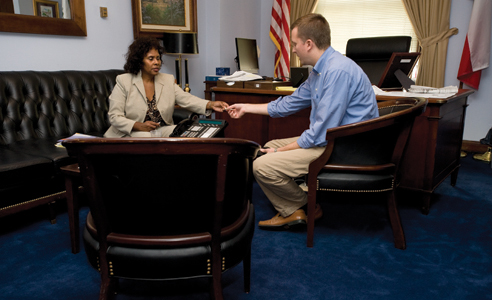 Cecelia Thomas, PhD, Social Work Faculty Scholar, University of North Texas, meeting with Josh Martin, Legislative Director to Representative Michael Burgess (R-TX). Dr. Thomas discussed her research on trauma and relocation experiences of older African-American survivors of hurricane Katrina, many of whom now reside in Texas.
Cecelia Thomas, PhD, Social Work Faculty Scholar, University of North Texas, meeting with Josh Martin, Legislative Director to Representative Michael Burgess (R-TX). Dr. Thomas discussed her research on trauma and relocation experiences of older African-American survivors of hurricane Katrina, many of whom now reside in Texas.
To expand academic leadership in geriatric social work, in 1999 the John A. Hartford Foundation funded the Hartford Geriatric Social Work Faculty Scholars Program administered by the Gerontological Society of America. The program provides financial and career support for junior social work faculty who are committed to academic careers in aging-related social work.
The Faculty Scholars program is led by Barbara Berkman, DSW, Helen Rehr/Ruth Fizdale Professor of Health and Mental Health at the Columbia University School of Social Work, and is administered by Linda Harootyan, MSW, Deputy Director of the Gerontological Society of America (GSA).
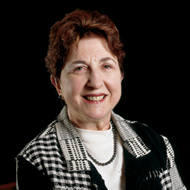
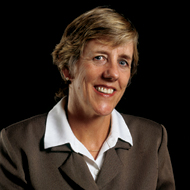
(Above) Dr. Barbara Berkman and (below) Linda Harootyan, Program Leaders
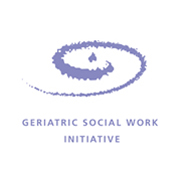 Hartford Geriatric Social Work Initiative
www.gswi.org
Hartford Geriatric Social Work Initiative
www.gswi.org
Each year, doctorally prepared social work faculty who are conducting community-based research are selected for the two-year program. Participants hone their leadership skills through formal training, skill-building workshops, mentoring, and peer networking. Each scholar is assigned a nationally recognized leader as a mentor. The mentor works with the scholar on professional development and enhancing research skills. Moreover, the numerous program workshops dedicate ample opportunities for peer networking.
Policy Leadership Institute
In 2001, the Policy Leadership Institute was launched as part of the Hartford Geriatric Social Work Faculty Scholars Program. The intensive two-day training focuses on framing issues for policy makers, understanding the legislative process, and using targeted communication strategies. In recognition of the interdisciplinary nature of geriatrics, in 2005 the Institute expanded to include nurses involved in Hartford Foundation training programs.“We want scholars to recognize that as faculty who conduct research, they have a responsibility to use what they’ve learned from their research to inform policy makers,” says Dr. Berkman.
The Policy Leadership Institute, which takes place in Washington, DC, helps participants develop an understanding of the connections between the research, academic, practice, and policy arenas. Institute participants learn that positive relationships with policy makers on the state and national levels can advance research goals, help disseminate knowledge, and ultimately improve the quality of life for older adults.
“First, academicians must feel empowered to become advocates, and then they must be given the tools to move in that direction,” says Ms. Harootyan. “The change we see in the attitudes and skills of the scholars in the two short days of this Institute is phenomenal.”
The Institute addresses theory and practice with keynote speakers from the world of aging and health policy, as well as interactive sessions on crafting a unique message and testifying at a hearing. The participants are also given a policy toolkit containing a variety of educational materials, such as tips for working with the media and understanding the legislative process.
Over the years, the participants have benefitted from the wisdom and personal examples of academicians who have become involved in policy making at such organizations as the Alzheimer’s Association, the Kaiser Family Foundation, Georgetown University, the Urban Institute, Schering-Plough, and AARP. Using the strategy of formal training, these accomplished speakers have shared practical advice on making research relevant and usable to policy makers, and inspired the scholars to expand their understanding of potential career opportunities.
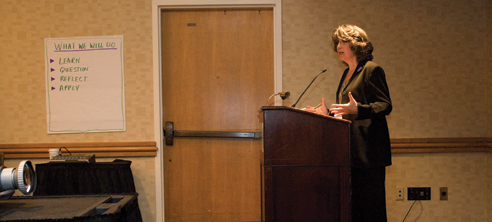
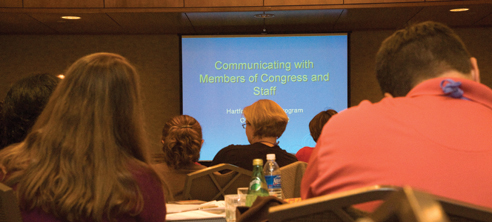 Elena O. Siegel, PhD, RN, BAGNC Postdoctoral Fellow, Assistant Professor, Oregon Health & Science University, sharing her testimony regarding her research on nursing homes.
Elena O. Siegel, PhD, RN, BAGNC Postdoctoral Fellow, Assistant Professor, Oregon Health & Science University, sharing her testimony regarding her research on nursing homes.
Marilyn Moon, Vice President and Director, Health Programs at the American Institutes for Research, emphasized to the scholars that having credible research doesn’t guarantee that one’s policy ideas will be adopted. Academicians must make their findings timely and know how to make their voices heard in the policy process.
During the Institute, an interactive communications session is devoted to crafting a short, memorable message summarizing each participant’s research. The scholars are reminded that a meeting with a Member of Congress or Congressional staff is an opportunity to communicate their message. The key is to be credible, concise, compelling, and consistent.
Another session, “Advice on Communicating with Staff and Members of Congress,” is led by current and former Hill staffers. Participants also hear insider information from a Library of Congress speaker who tells them “How Congress Really Works.”
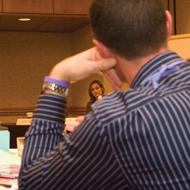
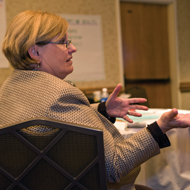
(Top) Elaine Dalpiaz, Policy and Legislative Consultant, Senate Special Committee on Aging, answering questions from Hartford Faculty Scholars.
(Bottom) Hartford Faculty Scholar, Jean Munn, PhD, offers her perspective during the 2008 Policy Leadership Institute.
One of the highlights of the Policy Leadership Institute is the mock hearing conducted by the institute’s organizer, Brian Lindberg, a social worker and former Congressional staffer. “Given the depth of experience and expertise that these scholars have accumulated in their careers, it is quite possible that they could be asked to provide expert testimony on an aging or health related issue, and we want them to be prepared and feel comfortable doing so,” observes Mr. Lindberg.
The Policy Leadership Institute culminates in visits to Congressional offices, where participants most often meet with staff members who handle the aging and health related issues. As the participants learn at the Institute, the relationship with the staff is nearly as important as meeting the elected official. Using their sharpened message about their research, the scholars experience firsthand what it is like to try to make a lasting impression in a fifteen minute meeting. Fortunately, “the focus of these first Hill meetings is to establish relationships,” points out Mr. Lindberg, “with the scholar becoming known to the legislator and staff as a resource or go-to person for certain issues.”
Lessons Learned
Reflecting on lessons learned in the eight years of the Policy Leadership Institute, Ms. Harootyan notes that the organizers had initially not anticipated how nervous the participants would be about advocacy. “We’ve worked on decreasing anxiety levels and have emphasized communication skills,” she says. Formal training is therefore essential.To reinforce lessons learned, the Institute utilizes a facilitator, Doris Reeves-Lipscomb, a social worker with extensive experience in aging policy and nonprofit strategic planning. At the end of each session, Reeves-Lipscomb helps the scholars reflect on the “take away” messages.
Faith Hopp, PhD, Social Work Faculty Scholar from Wayne State University, attended the 2008 Institute. “I learned that there are people on Capitol Hill with whom I might form a relationship and that they might find value in the knowledge I have,” says Dr. Hopp.
“Attending the Policy Leadership Institute gave me a glimpse of what takes place on Capitol Hill,” says David Jenkins, PhD, Social Work Faculty Scholar from Texas Christian University in Forth Worth. “Before this experience I didn’t appreciate that people with credible, quality information are in demand from Members of Congress.”
Outcomes
Policy Leadership Institute participants have put their training to good use. When Suzanne Prevost, PhD, RN, attended the Institute in 2007, she met with her Member of Congress, Bart Gordon (TN). Dr. Prevost began the meeting by thanking Rep. Gordon for obtaining funding for the Middle Tennessee State University School of Nursing, where Dr. Prevost is on the faculty. They discussed the need for additional funds for equipment. One month after the visit, Dr. Prevost received a letter informing her that the school would receive an additional $250,000 federal appropriation for equipment and technology.The work of Michael W. Parker, a Social Work Faculty Scholar from the University of Alabama, so impressed his Congressman that he placed a statement about Parker in the Congressional Record. The statement described the Military Parent Care Project that Parker modified to include older and disabled loved ones in caregiving preparations.
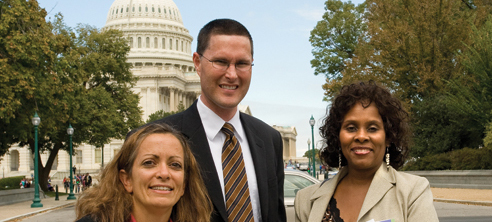
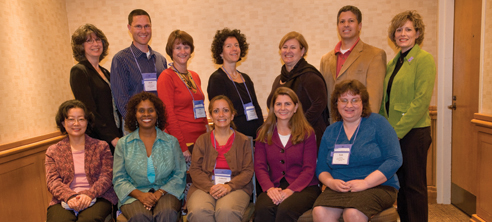 (Top) Hartford Social Work Faculty Scholars, Catherine Tompkins, David Jenkins, and Cecilia Thomas visting the Capitol.
(Top) Hartford Social Work Faculty Scholars, Catherine Tompkins, David Jenkins, and Cecilia Thomas visting the Capitol.(Bottom) 2008 Policy Leadership Institute participants.
Related Programs
The importance of developing leaders with the knowledge and expertise to influence public health policy has been recognized by other foundations. The Health and Aging Policy Fellows Program, funded by The Atlantic Philanthropies, allows Fellows to participate in the policy making process on either the federal or state level as legislative assistants in Congress or professional staff members in executive agencies or policy organizations.The Heinz Family Philanthropies has funded the John Heinz Senate Fellowship in Issues of Aging program for a decade. That fellowship, co-funded by the U.S. Senate, provided an opportunity for mid-career professionals in aging to learn public policy by working in the U.S. Senate. In 2008, the Heinz Fellowship was linked with The Atlantic Philanthropies’ aging policy program to create the joint John Heinz/Health and Aging Policy Fellowship, which funds one individual each year to work in the office of a U.S. Senator. The first joint fellow is Gretchen E. Alkema, PhD, a former Hartford Doctoral Fellow in Geriatric Social Work.
Dr. Alkema is working in the office of Senator Blanche Lincoln (AR), where she assists with bills that relate to aging, long-term care, and chronic care. For example, she is helping to craft the Geriatric Assessment and Chronic Care Coordination Act, which fits with her policy interests of creating better coordination between health care and social services for vulnerable adults with chronic conditions. “Being a Hartford Fellow gave me the confidence to take my ideas forward and bring a leadership perspective to the role I have here in Senator Lincoln’s office,” says Dr. Alkema.
Next: Profile in Leadership
A Clear Vision and Fearlessness
Michelle Putnam, PhD ›
